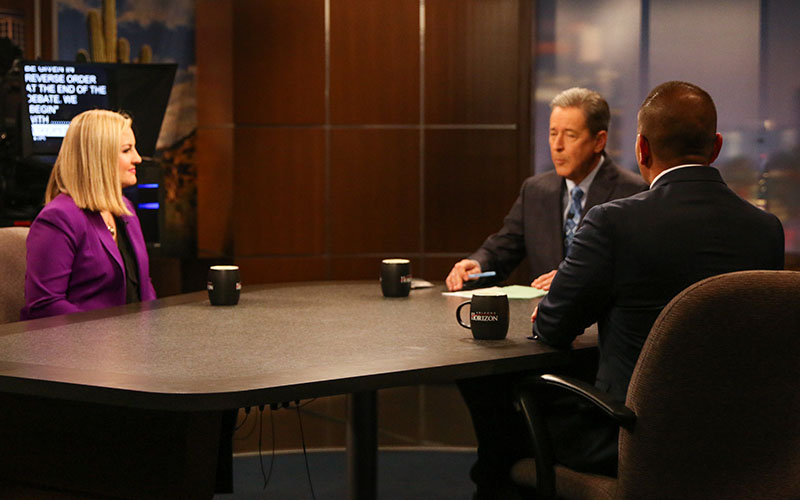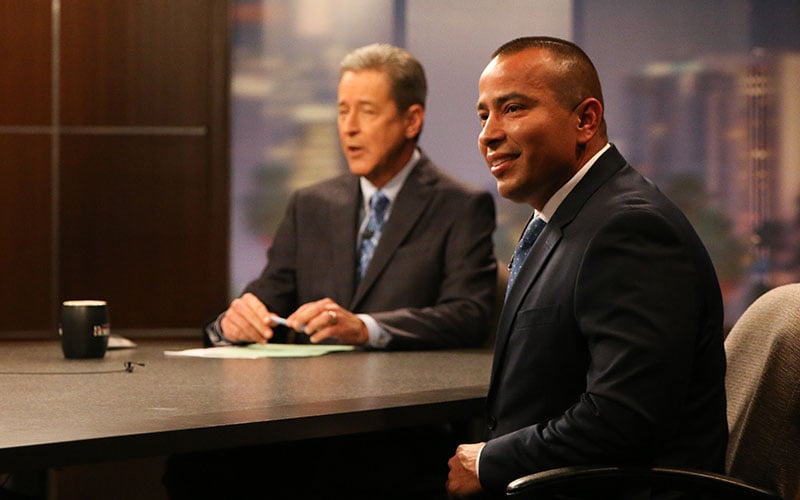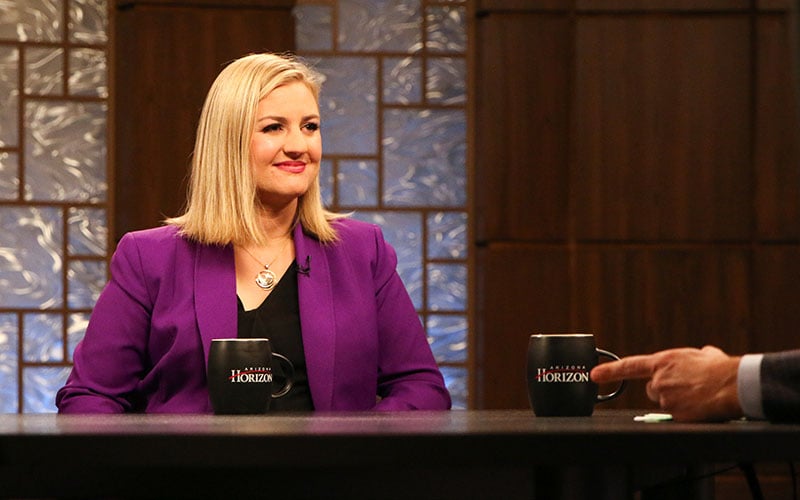
With the March 12 runoff election just weeks away, Phoenix mayoral candidates Kate Gallego and Daniel Valenzuela joined moderator Ted Simons on Wednesday for a debate hosted by Arizona Horizon. (Photo by Thalia M. España/Cronkite News)
PHOENIX – Mayoral candidates Kate Gallego and Daniel Valenzuela grew heated over what constitutes leadership on public-safety issues and pension reform, and they disagreed sharply on renovations to the Suns arena during one of their final debates before the March 12 runoff.
Over the 30-minute debate Wednesday night, Valenzuela touted his efforts to lift a police hiring freeze and tried to draw a distinction between leading and simply “showing up for a press conference.”
Gallego stressed her involvement in the city’s public safety committee and her actions on behalf of people “who usually don’t have an advocate.”
Gallego and Valenzuela, both Democrats who resigned their City Council seats to run for mayor, agreed Phoenix must deal with its enormous pension debt, but both opposed a ballot initiative being floated to address it.
In the debate sponsored by Arizona PBS, the two candidates diverged sharply on how to renovate the downtown Talking Stick Resort Arena, where the NBA Phoenix Suns have played since 1992. Gallego said private enterprises should pay for their own renovations and the city should prioritize where to allocate money.
Valenzuela, whom Gallego supporters targeted in an ad suggesting he supports giving tax dollars to millionaires, reiterated in an exasperated tone that the city – not some billionaire – owns the arena.

Phoenix mayoral candidate Daniel Valenzuela (with Arizona Horizon host Ted Simons) says all residents should feel safe regardless of where they live. “We need to lead with public safety, No. 1,” he said. (Photo by Thalia M. España/Cronkite News)
Early voting is underway in the runoff election to succeed Greg Stanton, who resigned in late May to make a successful run for Congress.
In a crowded November election, no mayoral candidate received more than 50 percent of the vote needed to win the race outright, which triggered the runoff election between the top two candidates.
If elected, Valenzuela would become Phoenix’s first Latino mayor, in a city where the population is 40 percent Hispanic, according to the 2010 census. Gallego would become the second elected female mayor.
In his opening statement, Valenzuela, a Glendale firefighter, highlighted public safety as his top priority. He was elected to the Phoenix City Council in 2011, and in his time there, he said, he led to lift the hiring freeze of first responders.
Gallego said she’s a good listener who has worked on behalf of people “who usually don’t have an advocate,” talking about partnering with AARP to bring Dial-a-Ride to the city.

Phoenix mayoral candidate Kate Gallego says her top three priorities are public safety, jobs and infrastructure. (Photo by Thalia M. España/Cronkite News)
Jabs at each other’s leadership history flared when the candidates were asked if they had “taken a lead” in public-safety issues. Gallego spoke about her accomplishments while Valenzuela insinuated Gallego was not a leader because there’s a difference between leadership and “showing up for a press conference.”
Gallego said she joined the Public Safety Committee soon after she was elected to the City Council in 2013 and worked with her colleagues to end the hiring freeze. She added she’s tried to solve such problems as ensuring all rape kits are tested. Phoenix police and the Maricopa County Attorney’s Office received Justice Department grants back in 2016 to test all rape kits and enter them into a central database.
Valenzuela responded that Gallego has voted on public safety, but he led on public safety.
Gallego said she has gone to Washington, D.C., to secure funding to hire new first responders, and that she has proposed hiring a chief technology officer for the Police Department.
Valenzuela lauded his push for police body cameras, saying his district, which included central and west Phoenix, had that technology years before it was adopted city-wide.
The argument of who actually “led” on such key issues as pension reform and public safety while on the council was a refrain Valenzuela returned to several times during the debate.
The mayoral candidates differ greatly on how the city should handle renovations of Talking Stick Resort Arena.
Valenzuela called an attack ad, which claimed he wants to give tax dollars to billionaires, misleading – a point he repeated several times. He said the city funds the arena through a Sports Facilities Fund, derived mostly from a tourism tax, and he emphasized the arena’s economic and job impact to downtown Phoenix.
Gallego said that, with the limited resources, city leaders must prioritize, adding that tourism taxes often are used for things that are “politically unpopular,” including, at one point, the Sheraton Hotel, which the city built in 2008 and owned until last year.
“I feel like professional sports are among the most profitable enterprises out there, and they should pay for their own facilities,” she said.
On Phoenix’s $4 billion pension debt, both candidates agreed that the ballot initiative that would not allow new spending, except for public safety purposes, was not the right way to tackle the debt but that the issue had to be addressed.
Gallego also said she is not a participant in that pension, so she had fewer conflicts of interests.
Valenzuela touted his work on Proposition 124, which helped provide sustainability to the pension trust. Gallego characterized his statements as a “victory” when the pension fund is only 40 percent funded, she said.
Valenzuela shot back and said he never “declared victory” and called Gallego’s track record “non-existent.”
After the debate, Gallego said she wanted to step up for the “little guy” and she’s proud to have endorsements from such groups as Equality Arizona, which fights for the LGBTQ community, and not special interest lobbyists.
Valenzuela said Phoenix needs to make sure residents receive the training and job skills needed to compete in the market, which would help them afford to live in the neighborhoods they choose.
Follow us on Instagram.